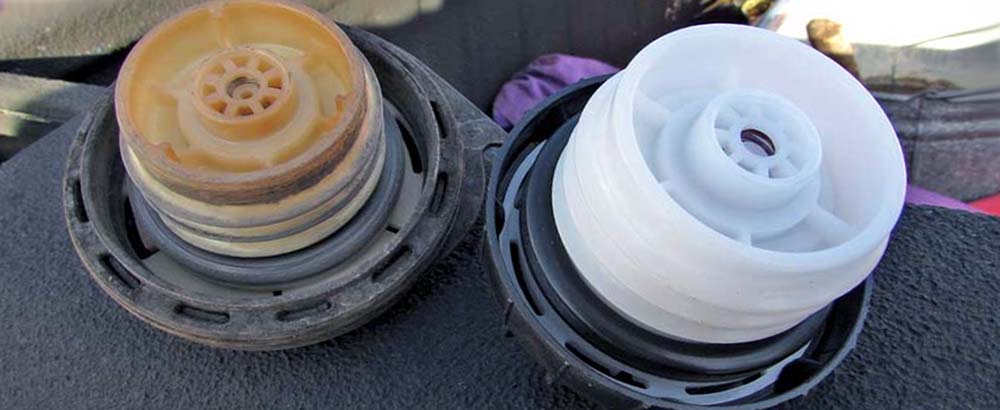A gas cap is a critical component of your vehicle’s fuel system, designed to seal the fuel tank and maintain pressure. It also helps prevent fuel vapors from escaping into the atmosphere, contributing to air pollution. A faulty or leaky gas cap can lead to reduced fuel efficiency, increased emissions, and even potential damage to your vehicle’s evaporative emission control system. This article will provide a comprehensive overview of the signs of a leaky gas cap, common causes, testing methods, and possible solutions to ensure your gas cap is functioning properly.
Signs of a Leaky Gas Cap
A leaky gas cap may not be immediately noticeable, but there are several signs that can indicate a potential issue. If your check engine light is illuminated on your dashboard, it could be due to a loose or faulty gas cap. Another sign is a strong fuel odor near your vehicle, especially after refueling, which may indicate a leaking gas cap. Additionally, a decrease in fuel efficiency could be caused by a leaky gas cap that is causing your vehicle to consume more fuel. It’s crucial to pay attention to these signs and address them as soon as possible to avoid further complications.
Common Causes of Gas Cap Leaks
Several factors can contribute to a leaking gas cap, including age, wear and tear, or damage. Over time, the seal on your gas cap may wear down, allowing fuel vapors to escape. Physical damage to the gas cap, such as cracks, can also result in leaks. Lastly, a loose or improperly tightened gas cap may not form a proper seal, causing fuel vapors to escape and leading to decreased fuel efficiency. Similarly, a leaking radiator cap can negatively impact your vehicle’s performance and cooling system efficiency.
Testing Methods for Gas Cap Leaks
Testing your gas cap for leaks involves a few methods, including visual inspection, pressure testing, and smoke testing. Start by visually inspecting your gas cap for any signs of damage, such as cracks or a worn seal. Ensure the gas cap is tightened properly and check if the issue persists. A pressure test can be performed using a fuel cap tester, which measures the pressure inside the fuel tank and helps determine if the gas cap is maintaining the proper pressure levels. Lastly, a professional mechanic can perform a smoke test, which involves using a smoke machine to introduce smoke into the vehicle’s evaporative emission system to detect any leaks in the gas cap or fuel system.

Solutions for a Leaky Gas Cap
If you find that your gas cap is leaking or damaged, there are several solutions that can help resolve the issue. First, ensure the gas cap is properly tightened, as a loose gas cap can cause leaks and trigger the check engine light. If the seal is worn or damaged, consider replacing it to create a proper seal and prevent leaks. Finally, if the gas cap is cracked or damaged, replace it with a new, compatible gas cap for your vehicle, which can be found at auto parts stores. It’s essential to address a leaky gas cap promptly to avoid more significant issues, such as damage to the evaporative emission control system or a decrease in fuel efficiency.
Preventative Measures for Gas Cap Leaks
To minimize the likelihood of gas cap leaks, consider taking the following preventative measures:
- Regularly inspect your gas cap for signs of wear and tear or damage.
- Ensure your gas cap is always properly tightened after refueling.
- Replace your gas cap periodically, even if it shows no visible signs of damage, as seals can wear down over time.
- Avoid using an ill-fitting or incompatible gas cap, as it may not create a proper seal.
- Keep an eye on your vehicle’s check engine light and investigate if it illuminates to catch any potential gas cap issues early.
By following these preventative measures, you can help maintain the integrity of your gas cap and reduce the risk of leaks.
Conclusion: Maintaining a Leak-Free Gas Cap
A functional gas cap is essential for maintaining your vehicle’s fuel efficiency, reducing emissions, and protecting the evaporative emission control system. By being aware of the signs of a leaky gas cap, understanding the common causes, and knowing how to test it for leaks, you can address potential issues promptly and ensure optimal performance. Additionally, incorporating preventative measures into your routine vehicle maintenance can help prevent gas cap leaks and extend the lifespan of your gas cap. Ultimately, taking care of your gas cap is a simple yet essential part of vehicle maintenance that can help prevent more significant problems down the road.



